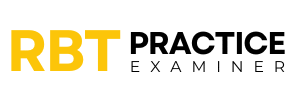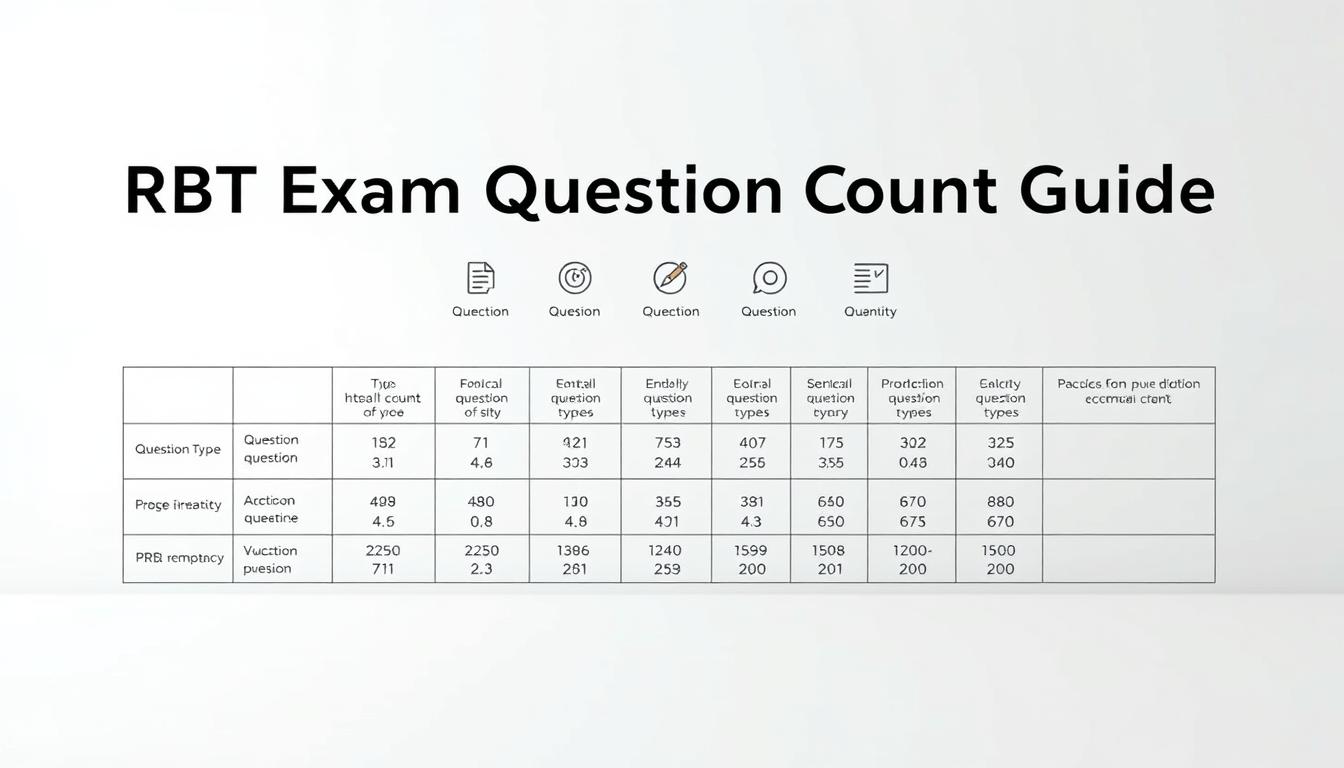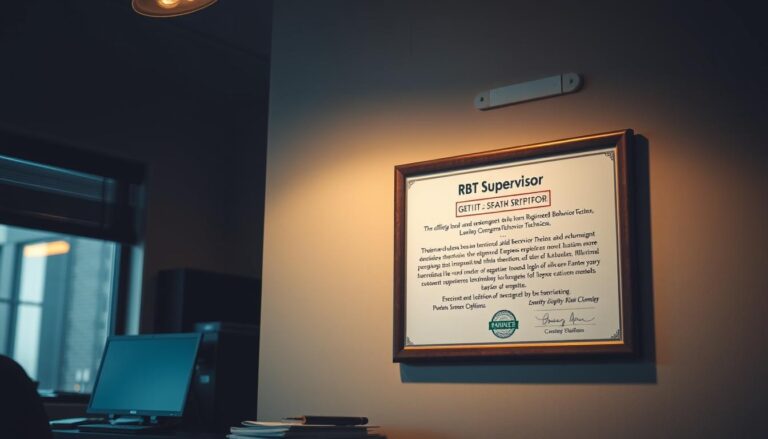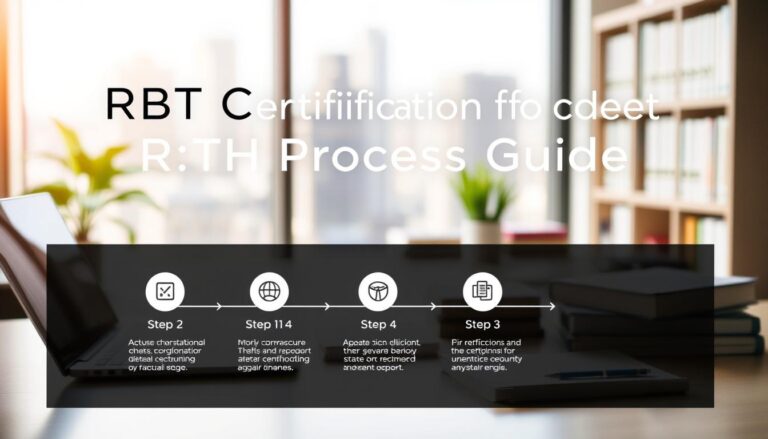How Many Questions Are on the RBT Exam? Prepare the Smart Way
Becoming a Registered Behavior Technician (RBT) is a big step in your career. Knowing how many questions are on the RBT exam is key to prepare well and pass.
The RBT exam tests your skills in behavior intervention. It’s a detailed test that checks if you know and can apply behavior analysis techniques.
Many wonder how many questions are on the RBT exam. Knowing the exam’s layout helps you feel less stressed and more confident. Our guide will cover the RBT exam question count and offer tips for studying.
Studying for the RBT exam is not just about remembering facts. It’s about learning how to take the exam and feeling sure of yourself. We’ll share strategies to help you feel ready and confident for the exam.
Understanding the RBT Exam Structure
Getting ready for the Registered Behavior Technician (RBT) exam means knowing its structure well. The number of questions is key to preparing. It’s vital for candidates to understand the exam’s main parts.
The RBT exam tests your knowledge in applied behavior analysis. You’ll face a structured test that checks your practical and theoretical skills.
Core Components of the Examination
The exam covers several important areas. These areas check if you’re ready to be an RBT:
- Measurement and assessment techniques
- Behavior reduction strategies
- Documentation and reporting skills
- Professional conduct and ethical considerations
Time Allocation for Different Sections
Knowing how to manage your time is key. You’ll need to think strategically and solve problems quickly.
| Exam Section | Time Allocation | Question Focus |
|---|---|---|
| Measurement Skills | 25 minutes | Data collection techniques |
| Behavior Reduction | 20 minutes | Intervention strategies |
| Professional Practices | 15 minutes | Ethical guidelines |
Testing Environment Overview
The RBT exam takes place in a professional setting. Candidates should expect a quiet, monitored testing environment for a fair test.
Preparation is not just about the content. It’s about understanding the whole exam framework. Knowing the number of questions helps you focus your study.
The Total Number of Questions on the RBT Exam
Knowing the number of questions on the RBT exam is key to good preparation. The RBT (Registered Behavior Technician) exam has 85 multiple-choice questions. These questions test your knowledge and skills in applied behavior analysis.
Understanding the number of questions helps you study smarter. Here’s a quick look at the exam’s structure:
- Total questions: 85
- Scored questions: 75
- Unscored pilot questions: 10
The exam covers important areas of behavior technician work. Candidates have 90 minutes to finish the test. You’ll need to manage your time well. Each question needs careful reading and thought.
Important facts about the RBT exam questions:
- Questions are multiple-choice format
- Covers practical and theoretical knowledge
- Requires a deep understanding of behavior analysis
Successful candidates often practice with sample questions. They also learn the exam’s structure well. The 85-question format checks your skills and knowledge in applied behavior analysis.
Breaking Down the RBT Exam Content Categories
Knowing how many RBT exam questions are in each category is key to getting ready. The exam’s questions are set up to check if you really know applied behavior analysis.
The exam has three main areas. These areas test a Registered Behavior Technician’s main skills. Each area is important for showing you know how to help with behavior problems.
Measurement and Assessment Questions
This part checks if you can gather and look at behavior data. It includes:
- Using methods to collect data
- Understanding how to show behavior on graphs
- Knowing about different ways to measure behavior
Behavior Reduction Questions
Candidates show their skills in managing tough behaviors here. The questions cover:
- How to do a functional behavior assessment
- Knowing how to use behavior intervention strategies
- Using positive ways to encourage good behavior
Documentation and Reporting Questions
The last part tests your skill in keeping professional records. Questions are about:
- Writing down sessions correctly
- Reporting ethically
- Talking with supervisors and team members
To do well, you need to really get applied behavior analysis and how to use it in real life.
How Many Questions on the RBT Exam Are Needed to Pass?
Knowing what it takes to pass the RBT exam is key to getting ready. The exam has 80 questions. You need to show you know your stuff through a detailed test.
To pass, you must get about 68 questions right. This means you need to score around 85%. You’ll need to understand behavior analysis well and know how to apply it.
- Total exam questions: 80
- Passing score threshold: 68 correct answers
- Minimum passing percentage: 85%
The exam checks if you know your stuff in different areas of behavior analysis. Each question is equally important. So, it’s vital to study well for all parts of the exam. Don’t just try to remember answers.
How you’re scored matters a lot. The 80 questions on the exam aren’t all counted. Some are for testing new questions. This means you might see more than 80 questions.
Getting ready is the most important thing. Here’s what we suggest:
- Use good practice materials
- Take lots of practice tests
- Know what the exam covers
- Learn how to take the test well
The aim is to show you’re really good at helping people with behavior problems.
Time Management Strategies for the RBT Exam
Getting ready for the RBT exam means managing your time well. Knowing how many questions there are and planning your study can really help. It’s all about smart planning and focused practice.
To ace the RBT exam, you need a solid study plan. It should cover all the material, practice, and keep you healthy.
Creating an Effective Study Schedule
Creating a good study plan involves a few steps:
- Check what you already know
- Find areas where you need to improve
- Set aside time for focused study
- Make achievable goals for each day and week
Practice Test Timing Techniques
Practicing under exam conditions boosts your confidence and time management. Here are some tips:
- Do full practice tests with a timer
- Keep track of how you do and how fast
- Focus on questions that take a long time
- Work on making quick decisions
Last-Minute Review Approaches
In the days leading up to the exam, focus on quick review methods:
- Quickly review key concepts
- Use flashcards for quick learning
- Practice deep breathing
- Make sure to rest well and stay healthy
Success in the RBT exam comes from consistent effort. Your time management and understanding of the exam will be key to passing.
Common Misconceptions About RBT Exam Questions
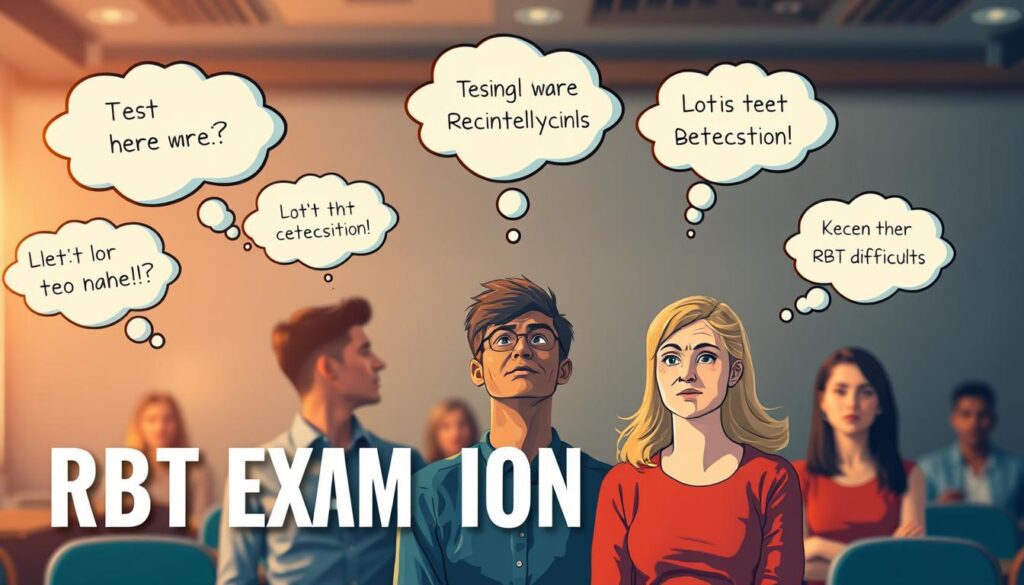
Many future Registered Behavior Technicians (RBTs) worry about the exam. They think it’s too hard or full of tricky questions. But, knowing the truth about the exam can help them feel more ready.
Some believe the RBT exam is impossible to pass or has tricky questions. But, it’s really about checking if you know how to apply behavior analysis in real life.
- Myth: The RBT exam has an overwhelming number of questions
Truth: The exam has about 80-85 questions, which is not too many.
- Myth: All questions are theoretical and complex
Many questions are about how you would act in real situations, not just theory.
- Myth: You need to memorize every single detail
The exam is more about understanding and applying what you know, not just memorizing.
To do well, it’s important to prepare in a smart way. Focus on understanding and applying what you learn, not just memorizing.
The questions on the RBT exam are made to see if you can use behavior analysis in real life. Knowing this can help you feel less stressed and do better on the exam.
Essential Study Materials for RBT Exam Preparation
Getting ready for the RBT exam needs careful planning and top-notch study tools. Knowing how many questions are on the exam is key. The right materials help you feel sure about tackling the exam questions.
Top performers don’t just memorize facts. They use the best study tools to ace the exam.
Recommended Study Guides
Choosing the right study guides makes learning easier. Look for guides that:
- Cover all major exam content areas
- Give detailed explanations of behavioral concepts
- Include practice questions that match the real exam
Online Resources and Practice Tests
Online learning sites are a big help for RBT exam prep. Check out these online tools:
| Resource Type | Key Benefits |
|---|---|
| Behavior Analyst Certification Board (BACB) Materials | Official guidelines and direct exam prep |
| Online Practice Exams | Simulates real test conditions and timing |
| Video Tutorial Platforms | Visual learning and detailed concept explanations |
Study Group Benefits
Learning with others can really boost your prep. Study groups offer many benefits:
- Shared knowledge and different views
- Mutual support and motivation
- Chance to explain complex ideas
- Instant feedback and learning
Success isn’t just about having lots of study materials. It’s about having a solid prep plan.
Understanding the Question Types and Formats
To pass the RBT exam, you need to know its question types and formats. The exam checks your skills in applied behavior analysis. It uses questions that test both practical and theoretical knowledge.
The RBT exam has a mix of questions to test your skills. You’ll see different types, like:
- Multiple-Choice Questions: These test your direct knowledge and understanding.
- Scenario-Based Questions: These ask you to think critically and apply your skills in real-life situations.
- Theoretical Concept Questions: These focus on the basics of behavior analysis.
When you think about the RBT exam, remember it’s a big test of your skills. It’s designed to check if you’re ready to be a Registered Behavior Technician.
| Question Type | Focus Area | Skills Tested |
|---|---|---|
| Multiple Choice | Direct Knowledge | Recall and Understanding |
| Scenario-Based | Practical Application | Problem-Solving |
| Theoretical Concepts | Behavior Analysis Principles | Analytical Thinking |
Knowing about these question types helps you study better. Each type needs a special way to understand and answer. So, getting ready for all of them is key to doing well.
RBT Exam Question Distribution by Topic
Knowing the RBT exam questions total helps candidates prepare better. The exam tests both theory and practical skills in applied behavior analysis.

The rbt exam question count is designed to check overall competence in many areas of behavioral intervention.
Theoretical vs. Practical Question Breakdown
The exam mixes theory with practical use. Here’s how it usually breaks down:
- Measurement and Assessment: 25-30% of questions
- Behavior Reduction Strategies: 20-25% of questions
- Skill Acquisition: 20-25% of questions
- Documentation and Reporting: 15-20% of questions
Critical Thinking Requirements
RBT exam questions ask for more than just remembering facts. You need to:
- Analyze behavioral data
- Solve complex intervention problems
- Understand ethical issues in analysis
- Apply what you’ve learned in real situations
Knowing the rbt exam questions total helps you study better. You can make sure you’re ready for all parts of the exam.
Tips for Tackling Multiple Choice Questions
When you face multiple-choice questions on the RBT exam, you need to think strategically. Knowing how many questions there are is just the start. Choosing the right answer is more than just guessing.
Here are some effective strategies for the RBT exam:
- Read each question carefully, paying attention to specific wording
- Eliminate obviously incorrect answers first
- Look for key phrases that provide critical context
- Use the process of elimination to narrow down possible answers
Key techniques for doing well on multiple-choice questions include:
- Understand the question stem completely
- Identify keywords that signal the most appropriate response
- Check your initial intuition against all available options
- Manage your time wisely during the exam
Creating a systematic way to tackle multiple-choice questions can help. Practice spotting small differences between answers. Remember, being precise is key when showing your knowledge of behavioral techniques.
| Strategy | Key Action | Expected Outcome |
|---|---|---|
| Elimination Method | Remove clearly incorrect answers | Increase probability of selecting correct response |
| Careful Reading | Analyze question wording | Prevent misunderstanding of exam questions |
| Time Management | Allocate specific time per question | Complete entire exam within time limit |
Your success on the RBT exam is not just about knowing the answers. It’s also about showing that knowledge through smart test-taking skills.
Practice Test Importance and Resources
Getting ready for the RBT exam needs smart practice. Knowing the rbt exam question total and amount is key. Practice tests help build confidence and spot areas where you need to improve.
Passing the RBT exam is not just about reading books. Practice tests give you a real feel of the exam. They help you get used to the types of questions and how to manage your time.
Where to Find Quality Practice Tests
- Behavior Analyst Certification Board (BACB) approved resources
- Online learning platforms specializing in ABA training
- Professional ABA training websites
- Professional certification preparation courses
How to Use Practice Tests Effectively
- Take timed practice tests to simulate exam conditions
- Review incorrect answers thoroughly
- Track your performance across different content areas
- Focus on understanding why an answer is correct
- Repeat practice tests to measure improvement
Doing well on the RBT exam means using practice tests wisely. They help you see what you’re good at and where you need to work harder. This way, you can make a study plan that really helps you.
Exam Day Preparation Strategies
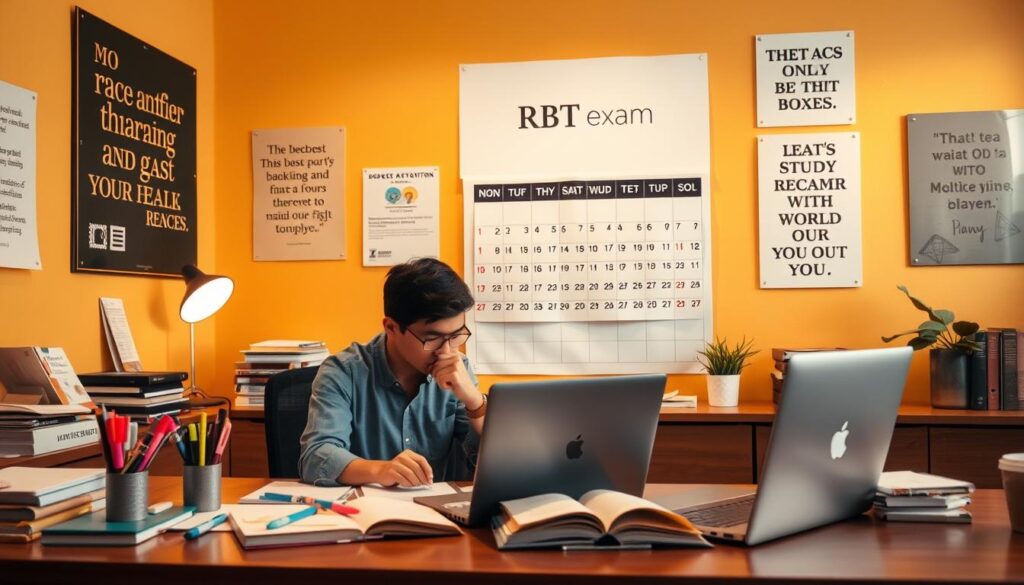
Getting ready for the RBT exam needs careful planning and staying calm. Knowing how many RBT exam questions there are helps you use your time wisely. This knowledge lets you plan a winning strategy.
Before the big day, make sure you have everything you need. Your checklist should include:
- Valid government-issued photo ID
- Exam confirmation document
- No electronic devices
- Comfortable clothing
- Water bottle and light snack
Mental prep is just as important. Try deep breathing to calm your nerves. Visualization can be a powerful tool – picture yourself answering questions with confidence.
Good sleep and food are key for doing well. Sleep well the night before and eat a healthy meal. Get to the testing center early to relax and finish any last-minute checks.
When you’re taking the exam, read each question slowly. The RBT exam checks your knowledge and how you apply it. Manage your time well, making sure you have enough to check your answers.
- Start with questions you’re most confident about
- Mark difficult questions to review later
- Use all available time for review
On exam day, your hard work and calmness are your biggest strengths.
Understanding Scoring and Pass Requirements
Understanding the RBT exam scoring can be tough. Knowing how it’s scored and what it takes to pass is key. The number of questions on the RBT exam greatly affects your score.
The RBT exam tests your knowledge and skills in applied behavior analysis. You need to show you know the material well to pass.
Score Calculation Method
Here’s how your RBT exam score is calculated:
- Total number of questions on the RBT exam: 85 multiple-choice questions
- Passing score: 80% or higher (about 68 correct answers)
- A scaled scoring system is used for fair evaluation
Retake Policies and Procedures
If you don’t pass the RBT exam the first time, don’t worry. You can try again with certain rules:
- Waiting period between exam attempts: 24 hours
- Maximum number of attempts: 8 in 12 months
- Full registration fee needed for each try
| Exam Attempt | Waiting Period | Cost |
|---|---|---|
| First Attempt | N/A | Full Registration Fee |
| Subsequent Attempts | 24 hours | Full Registration Fee |
Pro tip: Use practice tests and study materials to boost your RBT exam success. Each try is a chance to get better.
Real Experiences: What to Actually Expect
Getting ready for the RBT exam can be tough. People often wonder what it’s like and how many questions they’ll face. Hearing from others who have taken the exam can help reduce stress and give you a better idea of what to expect.
Those who have taken the RBT exam say it’s tough but doable. They mention that managing your time well and planning your answers are key. Here are some important points from those who passed the exam:
- Expect a test that checks your knowledge and skills
- The number of questions requires your full attention
- The multiple-choice format helps show your abilities
Getting ready emotionally is as important as studying. People who have taken the exam suggest ways to handle test day anxiety:
- Make sure you get enough sleep before the exam
- Get to the testing center early
- Bring all the required documents and materials
- Stay calm and read each question carefully
Old-timers of the RBT exam say that while the number of questions looks big, good prep makes a big difference. They stress the value of practice tests and deep study to feel confident during the exam.
Keep in mind, everyone’s experience is different. What works for one might not work for another. The main thing is to stay flexible, keep your focus, and believe in your hard work.
Conclusion
To pass the RBT exam, you need a smart plan. It’s not just about memorizing answers. You must understand behavioral analysis, study well, and feel confident when taking the test.
Getting ready for the exam is key. Knowing the number of questions and the different topics helps a lot. Use practice tests, study guides, and a clear plan to get through it.
Being a Registered Behavior Technician is a big achievement. Every question is a chance to show you know your stuff. Stay calm, believe in yourself, and get ready for the exam.
Your hard work will pay off. With good prep and a smart strategy, you can do great in applied behavior analysis. This will start a fulfilling career for you.
